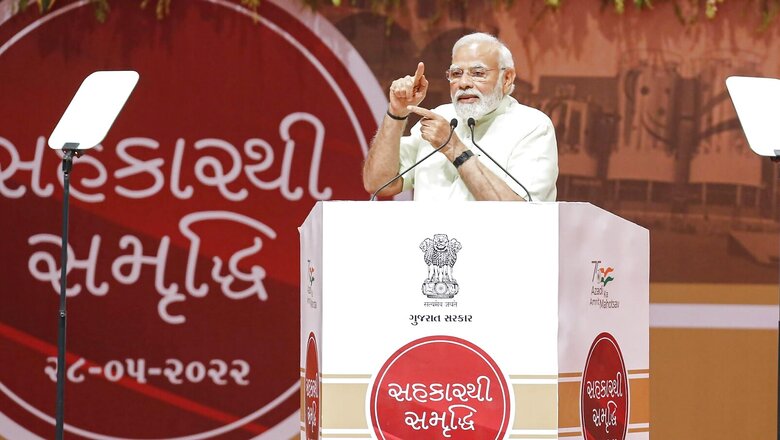
views
One of the BJP leaders disclosed to me the party’s key strategy to displace Congress from its grass-root influence in states like Madhya Pradesh. He said, “We slowly displaced the Congress from the cooperative movement, which worked as a connect for different aspiring, opinion-makers and entrepreneur groups in Madhya Pradesh that weakened the Congress in the state.” This narrative gave me a master key to understand the making of grass-root influences of political parties and role of cooperative movement in India. I remember, in Bihar too, the Congress was quite influential in the cooperative movement till 1990s but the growing political parties such as the Rastriya Janata Dal (RJD) slowly displaced them from the domain of cooperatives and acquire both power of the cooperative and the state. Similarly, in spite of lots of ups and downs in his political carrier, Sharad Pawar and his party, the Nationalist Congress Party (NCP), still successfully maintained its political clout and relevance in Maharashtra due to its stronghold in the sugar cooperatives in the state.
Gujarat, where the assembly election due this year, has cooperatives, which matter a lot in the development of society and politics. The Gujarat cooperative movement is quite strong in the domain of agriculture products such as cotton, groundnuts, coriander leaves, garlic and other commercial agricultural products, dairy, milk products and handicrafts and the sugar sector. The Congress retained its influence in the cooperative movement of Gujarat for a long time but now it is in the deep influence of the BJP, which has displaced the Congress leaders from the cooperative network and has become an influential part of it. It helped the party in – providing space to its cadre to do mobilisational politics thus becoming influential in the local power structure, and providing jobs to them to survive and sustain their life. The various agricultural products marketing cooperative committees (‘Samiti’ from local to apex) and cooperative banks produce jobs and employment too. The cooperatives in Gujarat, Maharashtra, Rajasthan, Madhya Pradesh and other states also emerged as job providing agencies, which absorbed cadres, supporters and sympathisers of the political parties who is influential in its structure to some extent. These cadres and supporters who enter in the cooperative movement also work for the party to build and strengthen its influence at the grass-roots.
Many important leaders of political parties in these states emerged from the cooperative movement. In fact, they run parallel power structures at various levels in these states. Cooperative federations contain a large number of active members who are crucial not merely as voters but as opinion and vote mobilisers and cadres for political parties. Gujarat cooperative Milk Marketing Federation is quite influential in the state and has around 37 lakh members. Similarly, the Agricultural Produce Marketing Committee also contains a huge number of producers, growers and other stakeholders, who emerge from production to marketing. The party who is in the power in the state plays important role in influencing the political opinion of the members of cooperative communities.
In Gujarat, the BJP projects the cooperative movement as the pride of the state. The achievement of Amul, Panchamrut Dairy and other cooperatives active in the state appear as an important plot and subplot of the pride and identity narrative of the state. When Narendra Modi was the chief minister of Gujarat, he gave enormous importance to the cooperative sector, and formed the Ministry of Cooperation in Gujarat, increased its budget at least seven times, removed some taxes in the sugar sector, reduced the MAT (minimum alternate tax) and surcharge. These all helped the BJP deepen its influence in the cooperative sector of Gujarat.
The cooperative movement produces long-term and sustainable influences, which form a strong political base for the political parties in states like Gujarat. But to enter in it, the parties need to work continuously in a sustained manner. Entering into the cooperative power structure takes time, but pays a lot in the making of political influences of parties at the grass roots. At this moment, the BJP is quite strong in the cooperative sector of Gujarat, which has helped its politics too.
Badri Narayan is Professor and Director at GB Pant Social Science Institute, Prayagraj, and author of ‘Republic of Hindutva’. The views expressed in this article are those of the author and do not represent the stand of this publication.
Read all the Latest News , Breaking News , watch Top Videos and Live TV here.




















Comments
0 comment